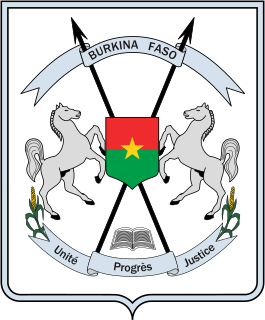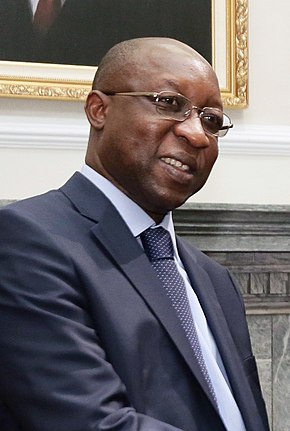Related Research Articles

Burkina Faso is a landlocked country in West Africa. It covers an area of around 274,200 square kilometres (105,900 sq mi) and is surrounded by six countries: Mali to the north; Niger to the east; Benin to the southeast; Togo and Ghana to the south; and Ivory Coast to the southwest. The July 2019 population estimate by the United Nations was 20,321,378. The country’s official language of government and business is French. Roughly 40% of the population speaks the Mossi language. Formerly called the Republic of Upper Volta (1958–1984), the country was renamed "Burkina Faso" on 4 August 1984 by then-President Thomas Sankara. Its citizens are known as Burkinabé. Its capital is Ouagadougou.

The Burkina Faso Armed Forces is the term used for the national military of Burkina Faso. The service branches of the armed forces include its Army, Air Force, National Gendarmerie and People's Militia. Being a landlocked country, Burkina Faso has no navy.

The Insurgency in the Maghreb refers to Islamist militant and terrorist activity in the Maghreb and Sahel regions of North Africa since 2002. The conflict succeeded the conclusion of the Algerian Civil War as the militant group Salafist Group for Preaching and Combat (GSPC) allied itself with al-Qaeda to eventually become al-Qaeda in the Islamic Maghreb (AQIM). Algeria and other Maghreb states affected by the activity have been offered assistance in fighting extremist militants by the United States and the United Kingdom since 2007, when Operation Enduring Freedom – Trans Sahara began.

Christianity is a minority religion in Burkina Faso. According to The World Factbook in 2019, Christians constitutes approximately 30% of the population, with Catholics representing 23.3% and Protestants 6.5%.. According to official government estimates in 2008 the percentages are lower: 23.2% are Christians. The exact percentages might be hard to accurately predict due to a high degree of Syncretism that occurs in the country between Christians or Muslims and Traditional indigenous beliefs.

Operation Barkhane is an ongoing anti-insurgent operation in Africa's Sahel region, which commenced 1 August 2014. It consists of a 4,500-strong French force, which is permanently headquartered in N’Djamena, the capital of Chad. The operation has been designed with five countries, and former French colonies, that span the Sahel: Burkina Faso, Chad, Mali, Mauritania and Niger. These countries are collectively referred to as the "G5 Sahel". The operation is named after a crescent-shaped dune in the Sahara desert.
On 16 December 2016, several dozen heavily armed gunmen attacked an army outpost in Nassoumbou, Soum Province, Burkina Faso, about 30 kilometres from the border with Mali, leaving at least 12 soldiers dead and 2 others missing. The attack, carried out by about 40 unidentified gunmen riding in pickup trucks and armed with AK-47s and rocket propelled grenades, was directed at an army base which was significantly damaged in the assault. The soldiers killed were members of an elite army counterterrorism unit. Billed as "murderous" by President Roch Marc Christian Kaboré, this was the second direct attack against the Burkina army since jihadist assailants surfaced in the country in early 2015.

Ansar ul Islam is a militant Islamist group active in Burkina Faso and in Mali. Ansar ul Islam is the Ansar Dine branch in Burkina Faso.

On 2 March 2018, at least eight heavily armed militants launched an assault on key locations throughout Ouagadougou, the capital city of Burkina Faso. Targets included the French embassy and the headquarters of Burkina Faso's military.

On 19 January 2019, the government of Burkina Faso dissolved due to the resignation of Prime Minister Paul Kaba Thieba and all members of his cabinet. President of Burkina Faso Roch Marc Christian Kaboré announced that he intends to form a new government; on 21 January, he began the process of appointing a new government by naming Christophe Joseph Marie Dabiré as the new Prime Minister, but his cabinet remains vacant. In the days leading up to the resignation of the government, the country faced a number of attacks from militant terrorist groups, and opposition members of government had previously called for the prime minister and defense ministries to step down, citing an inability to address terrorist attacks.

Terrorism in Burkina Faso refers to non-state actor violence in Burkina Faso that is carried out with the intent of causing fear and spreading extremist ideology. Terrorist activity primarily involves religious terrorism conducted by foreign-based organizations, although some activity occurs because of communal frustration over the lack of economic development. Recent attacks are concentrated in the Hauts-Bassins, Boucle du Mouhoun, Nord, Sahel, and Est regions, along the border with Mali and Niger. A series of attacks in Ouagadougou in 2016, 2017, and 2018 by Al-Qaeda in the Islamic Maghreb and its affiliates was particularly deadly, garnering international attention.
The Sanmatenga attacks occurred on 8 September 2019 in the Sanmatenga Province, Burkina Faso. In the Barsalogho Department a vehicle transporting people and goods, that was returning from a market, drove over an improvised explosive device (IED). 15 passengers were killed and six were injured in the IED attack. Most of the victims were traders. Meanwhile, around 50km to the east, a convoy with vans carrying provisions for people displaced by fighting was attacked by gunmen. In this attack, 14 people were killed. It is unknown who carried out this attacks.
The Burkina Faso mosque attack occurred on the evening of Friday, 11 October 2019 in a mosque in northern Burkina Faso which left 16 people dead and two injured. It happened while the residents were praying inside the Grand Mosque in Salmossi, a village close to the border with Mali. AFP reported that 13 people died on the spot while 3 died later due to the injuries.
The Dolmané gold mine attack occurred on 4 October 2019 near Madouji, Arbinda Department, Soum Province, Burkina Faso. The Dolmané gold mining site was attacked by suspected Islamic terrorists. The attack took place not far from where a bridge linking two northern towns was blown up in mid-September. At least 20 persons, mostly people that worked in the gold mine, were killed and an unknown number of people were injured. Both Islamic State and al-Qaeda have affiliated groups in the region. It is unknown which of the two was responsible for this attack.

On 6 November 2019, gunmen ambushed a convoy transporting workers of the Canadian mining firm Semafo near the city of Fada N'gourma, on a road to the firm's Boungou mine. At least 37 people were killed, and dozens more are missing or injured.
On 24 December 2019, a large group of militants on motorcycles attacked civilians and a military base in Arbinda, Soum Province, Burkina Faso. The attack and subsequent battle lasted several hours, resulting in the deaths of 35 civilians, 7 soldiers and 80 attackers. The attack was one of Burkina Faso's deadliest. A 48 hour state of mourning was declared after the attack.
In 2019 there have been many attacks in Burkina Faso on both soldiers and civilians.
References
- ↑ "Sixteen killed in Burkina Faso in suspected jihadist attack". October 28, 2019 – via uk.reuters.com.
- ↑ 16 shot dead in jihadist attack in Burkina Faso